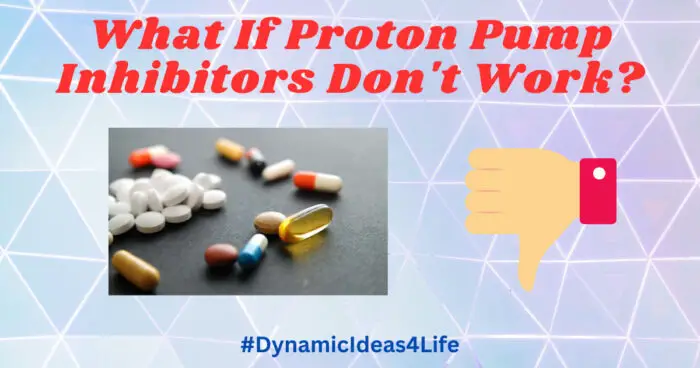Let’s say you are suffering from unbearable heartburn or Acid Reflux. Drinking water is not helping so you go see a doctor and you are given a prescription for Proton Pump Inhibitors (PPIs). Maybe Omeprazole or Prisolec or something like this but What If Proton Pump Inhibitors Don’t Work? This is something that for some people does happen. Medication does not work as intended and the patient is right back at square one still desperate for a solution. So what do you do?
It can be very frustrating if you either don’t know what the best solution is or if what you think is the one thing that can actually help does not do the job. I’m sure this is the case for many people and for anyone put in this position it might make you feel like banging your head against a brick wall. However, before you do let’s take a look at this…
What If Proton Pump Inhibitors Don’t Work?
What To Do?
So Proton pump inhibitors (PPIs) are a class of drugs that reduce the amount of acid produced in the stomach. They are commonly used to treat conditions such as gastroesophageal reflux disease (GERD), peptic ulcers, and Zollinger-Ellison syndrome. But whilst PPIs are highly effective for most people, some individuals may not experience relief from their
symptoms despite taking PPIs.
In this blog post, we will explore possible reasons for PPIs not working and discuss alternative treatment options.

For anyone facing stomach-related issues please keep reading until the end to see what else you can try. I am not a qualified health professional and I am sharing this only for informational purposes but I hope this can help.
Read Related Content:
- Natural Alternatives For Omeprazole
- Are Proton Pump Inhibitors Bad For You
- HCL Breakthrough Review (Our Top Recommended Supplement).
Throughout this post, I will look to cover as much ground as possible. For anyone reading this, I hope this is a good resource. Please let me know what you think in the comments. Now…
Possible Reasons for PPIs Not Working
There are several reasons why PPIs may not be effective for some people. These include:
- Incorrect Diagnosis: Sometimes, symptoms that are attributed to acid reflux may be caused by other conditions such as gallstones or heart disease. If PPIs are not providing relief, it is important to seek further evaluation from a healthcare provider to rule out other potential causes.
- Non-Acid Reflux: PPIs only work to reduce the amount of acid in the stomach. If reflux is caused by non-acidic contents such as bile or digestive enzymes, PPIs may not be effective.
- Poor Compliance with Medication: In order for PPIs to be effective, they must be taken as directed. Failure to take medication on a regular schedule or at the correct dosage may result in reduced effectiveness.
- Resistance to PPIs: Some individuals may not respond to PPIs due to genetic factors or changes in the stomach lining that make it more difficult for the medication to work.
- Other Underlying Conditions: In some cases, other underlying conditions such as Hiatal Hernias or esophageal motility disorders may contribute to symptoms that are not relieved by PPIs.
However, fortunately, there are other solutions to try and I will cover these in the next section below.
Steps to Take When PPIs Don’t Work
If PPIs are not providing adequate relief, there are several steps that can be taken to address the issue.
These can include:
- Seeking Further Evaluation from Your Healthcare Provider: If PPIs are not working, it is important to seek further evaluation from a healthcare provider to rule out other potential causes and explore alternative treatment options.
- Consider Lifestyle Changes: This should be your first port of call. Consider making changes to your lifestyle such as dietary modifications, weight loss, giving up alcohol and smoking, and even elevating the head of the bed may help to alleviate symptoms and improve the effectiveness of PPIs.
- Explore Other Medication Options: In some cases, alternative medicine options such as H2 blockers, antacids, or prokinetic agents may be effective in reducing symptoms. Even Betaine HCL may help too.
- Discuss Surgical Options: If lifestyle modifications and medication options are not effective, surgical options such as fundoplication or the LINX device may be considered. These procedures work to strengthen the lower esophageal sphincter and prevent acid reflux.
Now, point #2 on this list I think is worth exploring further. I think really that firstly you will want to determine the cause of your stomach acid-related issues but surely before going to the doctor or shelling out for supplements etc. definitely consider this.
Lifestyle Changes That May Help

In addition to medication and surgical options, there are several lifestyle changes that may help to alleviate symptoms of acid reflux and improve the effectiveness of PPIs. These include:
- Dietary Modifications: Avoiding trigger foods such as caffeine, alcohol, spicy foods, and acidic foods may help to reduce symptoms of acid reflux. Additionally, eating smaller, more frequent meals and avoiding large meals may help to reduce the amount of acid produced in the stomach.
- Weight Loss: Being overweight or obese can contribute to acid reflux symptoms. Losing weight through a combination of diet and exercise may help to reduce symptoms and improve the effectiveness of PPIs.
- Stop Smoking: Smoking can increase the production of stomach acid and weaken the lower esophageal sphincter, leading to acid reflux. Quitting smoking may help to reduce symptoms and improve the effectiveness of PPIs.
- Elevating Pillow Height: Raising the head of the bed by 6-8 inches may help to prevent acid reflux during sleep by keeping stomach contents from flowing back into the esophagus.
- Give Up Alcohol: In my own experience, this is one of the most common causes of excessive stomach acid. I’m sure anyone who drinks regularly will know this so definitely think about this. Read more in my guide here <<
*By making these lifestyle changes, individuals may be able to reduce symptoms of acid reflux and improve the effectiveness of PPIs. However, it is important to consult with a healthcare provider before making any significant changes to diet or exercise habits. They also may recommend other medications, which brings me to…
Alternative Medication Options To PPIs
Typically there are 3 different alternative medications to consider if proton pump inhibitors don’t work.
Each of these I will summarise in more detail below;
H2 Blockers Vs. Proton Pump Inhibitors
H2 blockers such as ranitidine (Zantac) and famotidine (Pepcid) work to reduce the amount of acid produced in the stomach. While they are not as powerful as PPIs, they may be effective in some cases.
Antacids Vs. Proton Pump Inhibitors
Antacids such as Tums or Rolaids work to neutralize stomach acid and provide immediate relief of symptoms. While they are not long-term solutions, they may be effective in providing temporary relief.
Prokinetic Agents Vs. Proton Pump Inhibitors
Prokinetic agents such as metoclopramide (Reglan) work to improve the movement of food through the digestive system and reduce the amount of acid refluxed into the esophagus.
How About Betaine HCl Supplements
One outside-of-the-box option to consider other than those mentioned are are Betaine HCL supplements. These actually work to increase the production of stomach acid, which might sound odd considering most will think their issue is because of too much stomach acid but this strangely enough may not only help relieve your discomfort but will do so much more effectively.
This is because what many believe to be too much stomach acid is in fact not. Elevated Abdominal pressure is more often than not the true culprit as this weakens the lower esophageal sphincter (LES) and forces gastric contents into the esophagus.
Of course, it may be best to determine if this really is the issue but as mentioned earlier in this article incorrect diagnosis is a common reason why PPIs do not work.
It can, unfortunately, be expensive to determine if this really is the issue but actually, you can try a Betaine HCL supplement to see if this helps or not.
If it doesn’t there is the nuclear option.
Surgery For Stomach Acid Related Health Issues
When it comes to surgery to help resolve stomach acid-related health issues such as GERD and Heartburn there are two main ones that really should be considered.
- Fundoplication
- LINX device
In some cases, lifestyle changes and medication options may not provide adequate relief for acid reflux symptoms. In these cases, surgery may be considered. The following are some situations where surgery may be appropriate:
- Severe Symptoms: If an individual is experiencing severe symptoms of acid reflux such as frequent heartburn, regurgitation, or difficulty swallowing, surgery may be considered.
- Medication Dependence: If an individual is heavily reliant on medications such as PPIs to manage their acid reflux symptoms, surgery may be a more effective long-term solution.
- Complications: If an individual has developed complications such as Barrett’s esophagus, esophageal stricture, or respiratory problems due to acid reflux, surgery may be necessary to prevent further damage.
There are several surgical options available for the treatment of acid reflux, including Fundoplication and the LINX device. These procedures work to strengthen the lower esophageal sphincter and prevent acid reflux.
However, It is always important to discuss the risks and benefits of these procedures with a healthcare provider to determine if surgery is the best option. I would definitely recommend Betaine HCL first personally but each to our own.
In Conclusion
If you suffer from Acid Reflux or any other related conditions it can be distressing if Proton Pump Inhibitors Don’t Work. As much as they are a common and effective treatment option for acid reflux, this can unfortunately be a problem for people. Yet, still, If an individual is not experiencing relief from PPIs there are several alternative medication options and lifestyle changes that may be effective as well as surgery which is also another option.
Although like any health problem, It is important to work with a healthcare provider to determine the underlying cause of acid reflux symptoms and develop a treatment plan that works best for you. With proper management, acid reflux, GERD, heartburn, and other stomach acid-related issues are treatable so definitely don’t give up hope.
Are There Any Side Effects of Proton Pump Inhibitors?
Yes, like any medication, proton pump inhibitors may cause side effects, such as headache, nausea, diarrhea, and abdominal pain. Long-term use of PPIs has also been associated with an increased risk of bone fractures and certain infections.
Can You Take Antacids with Proton Pump Inhibitors?
Yes, it is generally safe to take antacids along with proton pump inhibitors. Antacids work quickly to neutralize stomach acid, providing immediate relief of symptoms, while PPIs work to reduce the amount of acid produced in the stomach over time.
Can Acid Reflux Be Cured?
While there is no cure for acid reflux, it can be effectively managed with medication, lifestyle changes, and in some cases, surgery. With proper treatment, individuals with acid reflux can achieve relief from symptoms and prevent complications.
Can Acid Reflux Cause Cancer?
Untreated acid reflux can lead to complications such as Barrett’s esophagus, which is a precancerous condition. However, with proper management and treatment, the risk of developing esophageal cancer from acid reflux is low.
How Can You Prevent Acid Reflux Without PPIs?
There are several lifestyle changes that may help to prevent acid reflux, such as avoiding trigger foods, eating smaller meals, losing weight if necessary, and avoiding lying down for at least 2-3 hours after a meal. Additionally, elevating the head of the bed and quitting smoking may be helpful in reducing symptoms.
References
- Katz PO, Gerson LB, Vela MF. Guidelines for the diagnosis and management of gastroesophageal reflux disease. Am J Gastroenterol. 2013;108(3):308-328. doi:10.1038/ajg.2012.444
- El-Serag HB, Sweet S, Winchester CC, Dent J. Update on the epidemiology of gastro-oesophageal reflux disease: a systematic review. Gut. 2014;63(6):871-880. doi:10.1136/gutjnl-2012-304269
- Kahrilas PJ, Shaheen NJ, Vaezi MF, et al. American Gastroenterological Association Medical Position Statement on the management of gastroesophageal reflux disease. Gastroenterology. 2008;135(4):1383-1391, 1391.e1-5. doi:10.1053/j.gastro.2008.08.045
- Vakil N, van Zanten SV, Kahrilas P, et al. The Montreal definition and classification of gastroesophageal reflux disease: a global evidence-based consensus. Am J Gastroenterol. 2006;101(8):1900-1920; quiz 1943. doi:10.1111/j.1572-0241.2006.00630.x
- Fass R, Sifrim D. Management of heartburn not responding to proton pump inhibitors. Gut. 2009;58(2):295-309. doi:10.1136/gut.2008.167547


Anxiety and Depression best ways to lower blood sugar BiOptimizers blood pressure supplements blood sugar support supplements Digestive Enzymes Supplement digital products Dr Sam Robbins Erectile dysfunction Exercise Gut Health Healthy Living heart health HFL how to lower blood sugar levels How To Lower Cholesterol insulin resistance joint health supplement Keto keto dieting Keto Diet Weight Loss leaky gut supplements leptin resistance list Magnesium deficiency Matt Gallant mental health multivitamins Nootropics nutrient supplements Probiotics Probiotic Supplements proteolytic enzymes reverse type 2 diabetes stress and anxiety stress relief vitabalance vitapost Wade Lightheart weight loss articles weight loss diet plans weight loss product reviews weight loss supplements weight loss supplements that work weight loss tea
